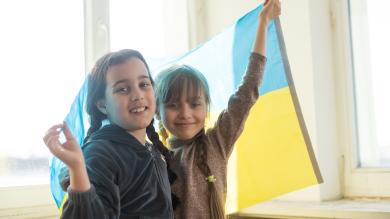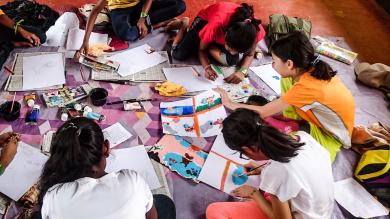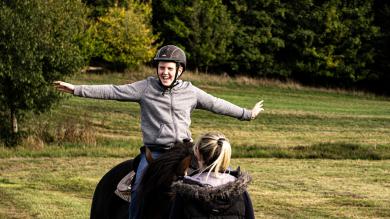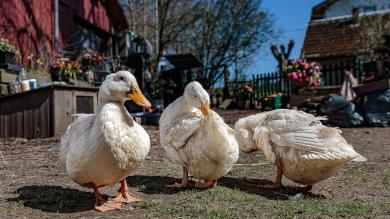
pme donates: "Children of fallen warriors"
Sometimes words are not enough to describe the extent of loss and fear that children experience in war. Olga Tovpeko, initiator of the NGO "Important", has experienced this herself: When her husband joined the army at the start of the war, it became clear to her how much the service of a parent changes the lives of children - and how urgently they need psychological support during this time.
"The children's stories touch us deeply and demand a lot of compassion."
1. why did you set up the "Children of Fallen Warriors" project?
Olga Tovpeko: The husband of a friend from my student days was killed. The grandson of a grandmother I met on the playground lost his father. The father of one of my son's classmates was also killed in the war. Many men died - and I began to ask myself: How are their children actually doing?

Psychologist Olga Tovpeko has launched the "Children of fallen Warriors" project.
It became clear that many of these children often remain "invisible". They continue to attend school, but loss and grief are rarely talked about there. Some parents find words for the pain, others do not have the strength to talk about it. The public health and education system faced the challenge of providing appropriate support.
We quickly realized how important it is to create groups for children whose parents have died in war or are missing. These children face challenges that go far beyond their age.
This is how this new project came about, in which children find a safe space to talk openly about their feelings - about fears, sadness, worries, anger, memories and the deep, everlasting love for their deceased parents.
2. how exactly does the project support children who have lost a parent in war?
Under the professional guidance of our mentor Linda Goldman, an experienced American psychotherapist and educator, we have developed a program specially tailored to these children. It consists of three central building blocks:
- Exploring the world of emotions: Children learn to recognize, understand and express their feelings in a safe way. They let go of fear and anger and gradually find more space for calm and joy.
- Life and loss: The children talk about death - what it means, how they experience it and what remains after the loss of a loved one. They learn how they can preserve memories and love while continuing on their own path.
- Exploring personal resources: The children are encouraged to discover their own strengths - both internally and externally. They develop a positive self-perception and learn skills that help them to deal with challenges in a resilient way.
Before and after the program, we work with the children to record how their feelings and well-being change. Time and again, we see that anxiety, depressive moods, physical complaints and learning difficulties decrease significantly - often by at least 25 percent, in some cases even by up to 40 percent.
This development makes us very proud and shows how valuable and effective our work is for the children concerned.
3. how important is psychological support for these children?
Stories of individual children like nine-year-old Olena (name changed) make it clear how valuable this support is:
After her father was killed in the war, Olena refused to talk about the loss at all. Any mention of her father triggered anger towards her mother and older sister. She became reserved, sharp-tongued and emotionally withdrawn. At first, she found it difficult to join the support group - she remained silent and refused to turn on her camera.

Children cope with fears and grief differently than adults.
But little by little, surrounded by other children with similar experiences and supported by the group psychologist, she began to open up. First with short sentences, later with memories. Her mother says: "It felt like someone had torn down the wall between us. We were finally able to talk about our father.
Voices like these show how important it is to give children a protected space for their feelings and to accompany them on their journey.
4 What are the biggest challenges in your work?
One of the biggest challenges is communicating to parents how important early support is for their children. Many only come when there are already clear problems. It is often underestimated how much children suffer from the loss - especially if they do not show their feelings openly. If the child doesn't cry or scream, they think that everything is "okay". However, children often express their pain differently than adults, for example through restlessness, withdrawal or anger, which can easily be overlooked.
The work is also emotionally demanding for our team. The children's stories touch us deeply and require a great deal of compassion. In order to strengthen ourselves, we regularly exchange ideas in supervision sessions and pay attention to our own emotional balance.
Another challenge is funding. We are not a large organization, but a dedicated team that supports families on a daily basis and relies on sufficient funding to do so.
5. what was achieved with the support of pme Familienservice ?
The donation from pme Familienservice was of great importance to us. It has enabled us to set up an administrative team for fundraising and sustainable development and to start new projects for children.
Thanks to this support - and other contributions from committed private individuals - we have been able to set up 14 children's groups and 6 adult groups. As a result, 105 children and 64 wives of soldiers receive psychological support.
We are also particularly grateful for the opportunity to set up special groups for children of missing soldiers. This work is very sensitive, as it often remains unclear whether the hope of a reunion will be fulfilled. Together with Linda Goldman, we have developed a special program based on a therapeutic story about a lost puppy.

Update call: The trainers are in close contact.
6. what are your plans for the future?
We definitely want to continue our work, because there is still a lot to do. Especially children of prisoners of war, wounded soldiers and veterans are waiting for support - often there is still a lack of financial resources. Many of these children experience difficult situations when their parents are struggling with the physical or psychological consequences of war.
This is also a major challenge for parents. They often don't know how to talk to their children about these issues and how to comfort them. That is why it is important to us not only to support the children, but also to strengthen the parents - so that emotional stability is maintained in the family, even after the group program.
We appreciate any support for our work. Further information, including donation options, can be found on our website.
Social commitment of the pme Familienservice
The "pme donates" fundraising campaign has been running for four years, giving pme team members the opportunity to nominate charitable organizations in the areas of international development aid, social work, climate and animal protection and culture for a donation, which they actively support. All team members then vote for the organizations they want to support. The organizations with the most votes receive a donation from pme Familienservice. In 2024, six national and international organizations received a total of 50,000 euros in donations.











